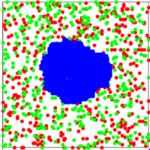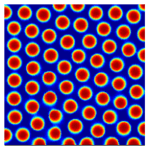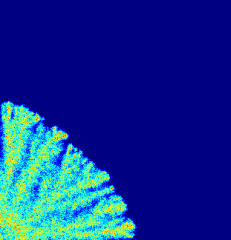Profile
Fiona Macfarlane
Curriculum Vitae
-
Education:
Coltness High School, North Lanarkshire (2005-2011); BSc in Mathematical Biology, University of Dundee (2011-2015); PhD in Mathematics, University of St Andrews (2015-2019);
-
Qualifications:
Standard grades: Maths, English, Music, Geography, German, Graphic design, Biology, Chemistry; Highers: Maths, English, Music, History, Biology, Chemistry, Modern Studies; Advanced Highers: Maths; BSc Hons Mathematical Biology; PhD Applied Mathematics.
-
Work History:
Warden at North Ledaig Caravan Park, Oban (summers 2010-2013); iGEM team member (international biological research competition) at the University of Dundee (2015); Research student and maths tutor at the University of St Andrews (2015-2019); Researcher (2019-Now);
-
Current Job:
Post-doctoral researcher
-
Employer
University of St Andrews, School of Mathematics and Statistics.
-
About Me
I am a bit of a geek and really enjoy maths and biology. I also love sci-fi and fantasy books and films. In my free time I love hillwalking, kayaking and volunteering with my church and the Girls' Brigade, a youth organisation.
-
Read more
I live in Dundee which is a small city on the east coast of Scotland, where I have lived since 2011. I live by myself, which I really enjoy as I get lots of peace and quiet.
When I am not working I like to do outdoorsy things like hillwalking, kayaking and sailing. I also have quite a big family so like to spend time with them whenever possible. When it is raining or too cold to be outside (which is most of the time in Scotland), I enjoy playing piano and watching films.
I don’t get that much free time though as I do quite a bit of volunteering at my church and with a youth organisation, the Girls’ Brigade (GB). This involves playing games, teaching crafts and having fun with girls, primary and high school aged, one night a week. I also am part of a few local and national groups with this organisation, so help organise events for the girls involved all over Scotland. This year I am even organising a big STEM (Science, Technology, Engineering and Maths) competition. Through GB I get to attend international events in nice places like Australia, Kenya and Zambia!
-
How I Use Maths In My Job:
The maths I mainly use in my job is probability, that is how likely it is that something will happen. I also use something a little more complicated called differential equations, these equations let us work out how something changes over time and/or how it moves around.
-
My Work
I try and understand biological problems, like cancer, using maths.
-
Read more
I use maths to investigate biological problems. Mainly I work on probability based models of biological cells. Using my computer I develop simulations that let the cells move around and interact with each other. We can apply this to lots of different biological situations, some of the ones I work on are:
– How immune cells interact with cancer cells
– How cells interact with different chemicals to make patterns
– How cancer cells interact with each other to grow
– How immune cells move around the body
These models can then be used to investigate and answer different questions, for example:
– How can we make the immune system stronger against cancer?
– How do animals get their stripes/spots (tigers, leopards, giraffes)?
– How does cancer grow and invade in the body?
The results can then be used to give us ideas on how to treat cancer and a better understanding of different biological processes.

Example of model where immune cells (red/green) can interact with tumour cells (blue). In this case the tumour has been able to grow quite large,

Example of cells interacting with chemicals to form patterns. Initially each position in the square had the same number of cells, at the end cells move towards each other to form circular groups.

Example of model where cancer cells (green/yellow) invade healthy tissue (blue)
-
My Typical Day
I usually come into the office at 8.30am, although some days I work from home. I check my emails and then check if I have any new results from my computer simulations, as I run these over night. I then write up any new results, and also try to read new research papers for ideas. Some days I may have meetings with the people I work with too. I usually go home about 5pm, and set up any new simulations just before that.
-
Read more
I am not sure if I ever have a typical day! I usually come into the office for around 8.30am, check emails and write out a list of what I want to try and do that day. Then I get on to the main parts of my work, which is working on different projects. Usually I go home around 5pm.
For each project I may be doing something a little different each day. From the start of a new project to the end of it there are lots of steps:
1. Come up with an idea for a project. This involves reading up on biological problems, and work that other mathematicians have done already.
2. Start thinking about how we can use maths to solve our problem. For me this usually involves starting to write up code (algorithms) that can describe our biological problem.
3. I then check that my code does what I want it to, and also is as realistic as possible biologically. This involves choosing parameter values, for example we need to tell the computer how fast a cell will move. We can get this information from biological experiments to make our model more realistic.
4. Once I have code then I can start running different simulations, to test different biological situations. For example, if we want to know what is the difference if the cancer cells can grow really quickly compared to if they grow very slowly. To do this we would run one set of simulations with a slow growing tumour and one set with a fast growing tumour and compare the results.
5. After all the simulations are done (this can take anywhere from 10 mins to a few months!) we can then start comparing the results. We then check our results make sense and whether they tell us anything useful about the biological problem.
6. Once we have all our results and know what they mean we can write up our work. Once written up we send it off to different journals to be published, so that other people can read it.
7. Once we have finished a project, we might think about how we can take it further and develop it to answer even more biological problems.
These steps are just a rough outline of what is involved in each project, and can take several months or even years to complete.
-
The CHRISTMAS LECTURE related to my work:
-
My Interview
-
My favourite CHRISTMAS LECTURES memory is:
I like the robot that could solve a Rubiks cube
How would you describe yourself in 3 words?
friendly, enthusiastic and caring
What or who inspired you to follow your career?
When I was at school I was not very good at maths, but started to really enjoy it in my final year. I started a biology degree at university and was not enjoying all of it, but then found out I could change to doing a degree in maths and biology. This was really interesting and my lecturers encouraged me to go into math biology research.
What's your favourite use for maths in everyday life?
Probably all the algorithms behind online search engines and apps, as I wouldn't get very far without them.
What did you think about Maths when you were in school?
I was actually not very good at maths in school, so didn't really like until my last year.
What did you want to be after you left school?
When I was in primary school wanted to be a fashion designer, even though I can't draw. Then I wanted to become a primary school teacher.
Were you ever in trouble at school?
I did get in trouble for laughing too much in maths class once, but I was usually quite good at school
If you weren't doing this job, what would you choose instead?
I think I would probably be a maths teacher, I enjoy trying to get others excited about maths.
Who is your favourite singer or band?
This is a tough question, my favourite music depends on my mood. At the moment I really like a Scottish folk/pop band called Tide Lines, but I like most music from classical to Disney to rock!
What's your favourite food?
I love pizza, but try not to eat it too much!
What is the most fun thing you've done?
A few years ago I was in Australia and got to go snorkelling at the Great Barrier Reef. It was really cool to see all the different types of fish and I even saw a (very small) Reef Shark!
Tell us a joke.
Why a 6 afraid of 7? Because 7 8 9
-
